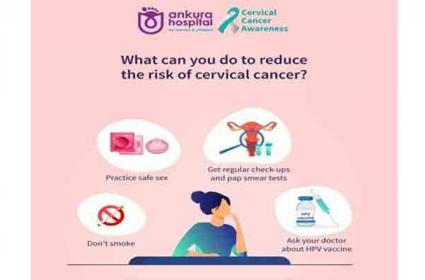Why Regular Pap Test Is A Must For Every Woman

India accounts for nearly one-third of the world’s cervical cancer deaths globally.
One woman is diagnosed with cervical cancer every minute globally.
In India, one woman dies of cervical cancer every eight minutes!!.
Cervical cancer is not hereditary.
Did you know that cervical cancer is not hereditary? A lot of people believe in this myth and it is precisely these misconceptions that we wanted to address with our cervical cancer awareness campaign”, says Dr. Lakshmi Rathna M, MBBS, MD (OBG & Gyne), DGO, PGDMLS, FICOG, Sr. Consultant Obstetrician and Gynecologist at Ankura Hospitals for Women and Children.
An estimated 123,907cervical cancer cases are recorded every year in India and 77348 die due to it !! This number might be an underestimate as many cases remain undiagnosed in rural and impoverished areas. Experts estimate that approximately 1 in 53 Indian women will get cervical cancer during their lifetime and currently, India accounts for nearly one-third of the global cervical cancer deaths.
January has been designated as cervical cancer awareness month worldwide and on this account, let’s look at some pertinent information about this disease. Cervical cancer is an abnormal tissue growth in the cells of a woman’s cervix and most cases are caused by the sexually-transmitted human papillomavirus (HPV), which is preventable by taking the HPV vaccine. Cervical cancer develops very slowly over the course of many years. If the changes in the cervical cells are found in the early stages, it can be diagnosed and treated. If not, the cancer cells will spread to other parts of the body and it will become deadly.
Vaccination for the prevention of cervical cancer provides protection against multiple HPV variants. Two licensed vaccines are available in India. Vaccination can be done in girls from the age of 9 years onwards. The HPV vaccine is known to be most effective before women become sexually active, which is before they get exposed to the virus. Thus, just like many other vaccinations that a child receives, this too can be planned in consultation with an expert. If not given at an earlier age, then the vaccine can be administered till the age of 26 years for protection.
Vaccination is also approved for women from 27 to 45 years. But, at this stage, women should discuss it with their gynecologist to know whether they should receive it.
You might be at higher risk for cervical cancer if you:
● Started having sex before age 16 or within a year of starting your period
● Have multiple sexual partners
● Take birth control pills, especially for longer than 5 years
● Have a weakened immune system
● Have a sexually transmitted disease (STD)
● Smoke cigarettes
There are a few ways to reduce the risk of cervical cancer and we can do our part by getting regular health checkups, especially between the ages of 30 and 39 as statistics inform that women of these ages account for the majority of cervical cancer related deaths in India. A regular health checkup often involves a Pap smear test. It is a routine cervical cancer screening procedure and women should get a Pap test regularly from the age of 21.
In general, to reduce cervical cancer risk, the recommendation is that if you are:
● 21–29 years old, get a Pap test once every 3 years.
● 30-65 years old, get a Pap or HPV test once every 3 years.
● Older than 65 years old, you may not need Pap tests anymore.
There is also another myth that if you have HPV, you will get cervical cancer. That’s not true. Usually, HPV clears up from our immune system by itself. In a small number of women, the virus stays in the body and over time causes cervical cancer. Dr. Lakshmi Rathna M, MBBS, MD (OBG & Gyne), DGO, PGDMLS, FICOG, Sr. Consultant Obstetrician and Gynecologist at Ankura Hospitals for Women and Children says, “You can safely take the HPV vaccine until the age of 26 years old. You can speak to your doctor about the vaccine, as its administered on a case by case basis.”
Also Read: Doctor's View: Making Lifestyle Changes Can Prevent Cancer
























